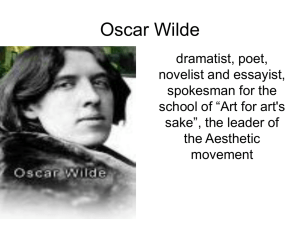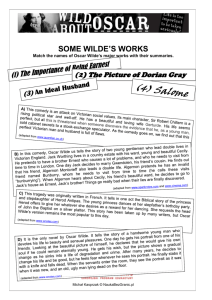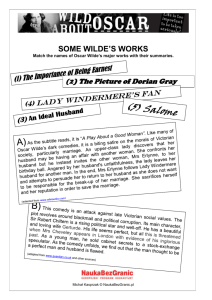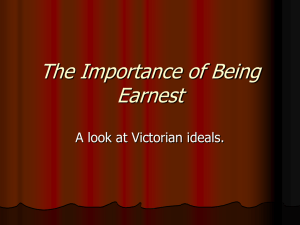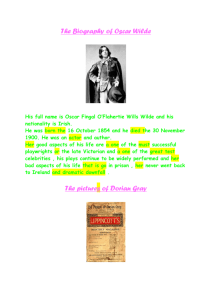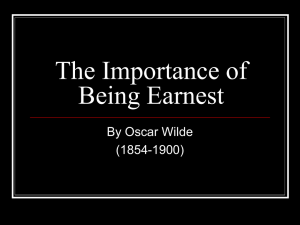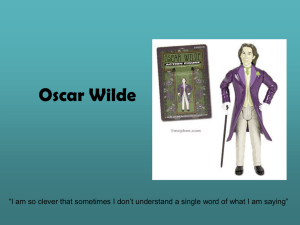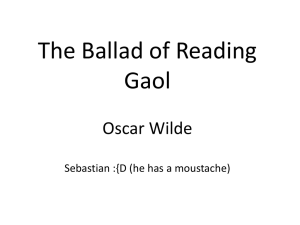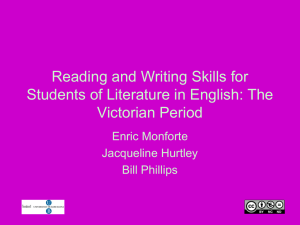二、结题报告 Realistic Concern in The Importance of Being Earnest
advertisement
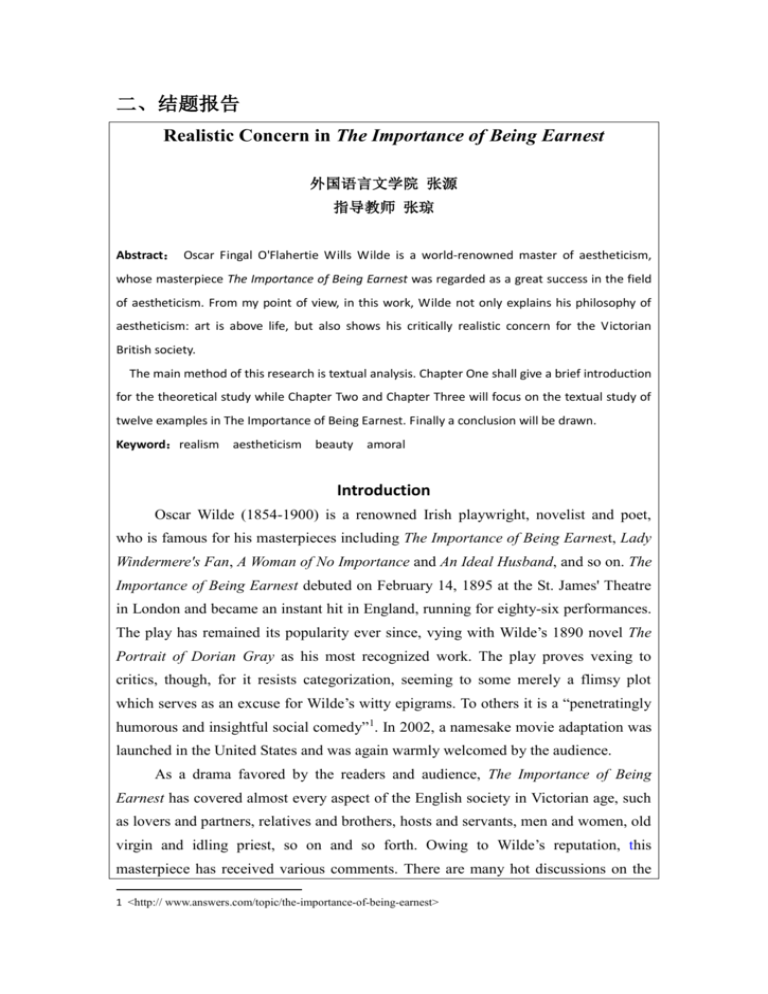
二、结题报告 Realistic Concern in The Importance of Being Earnest 外国语言文学院 张源 指导教师 张琼 Abstract: Oscar Fingal O'Flahertie Wills Wilde is a world-renowned master of aestheticism, whose masterpiece The Importance of Being Earnest was regarded as a great success in the field of aestheticism. From my point of view, in this work, Wilde not only explains his philosophy of aestheticism: art is above life, but also shows his critically realistic concern for the Victorian British society. The main method of this research is textual analysis. Chapter One shall give a brief introduction for the theoretical study while Chapter Two and Chapter Three will focus on the textual study of twelve examples in The Importance of Being Earnest. Finally a conclusion will be drawn. Keyword:realism aestheticism beauty amoral Introduction Oscar Wilde (1854-1900) is a renowned Irish playwright, novelist and poet, who is famous for his masterpieces including The Importance of Being Earnest, Lady Windermere's Fan, A Woman of No Importance and An Ideal Husband, and so on. The Importance of Being Earnest debuted on February 14, 1895 at the St. James' Theatre in London and became an instant hit in England, running for eighty-six performances. The play has remained its popularity ever since, vying with Wilde’s 1890 novel The Portrait of Dorian Gray as his most recognized work. The play proves vexing to critics, though, for it resists categorization, seeming to some merely a flimsy plot which serves as an excuse for Wilde’s witty epigrams. To others it is a “penetratingly humorous and insightful social comedy”1. In 2002, a namesake movie adaptation was launched in the United States and was again warmly welcomed by the audience. As a drama favored by the readers and audience, The Importance of Being Earnest has covered almost every aspect of the English society in Victorian age, such as lovers and partners, relatives and brothers, hosts and servants, men and women, old virgin and idling priest, so on and so forth. Owing to Wilde’s reputation, this masterpiece has received various comments. There are many hot discussions on the 1 <http:// www.answers.com/topic/the-importance-of-being-earnest> sexuality, language, the aesthetic elements and the dandyism of the character, etc. Some critics speak highly of the work while others express their doubts. The Importance of Being Earnest, is generally a drama about the idle life of two young brothers living in the country and the town respectively. The story is filled with humor and satire, thus offering its readers and audience a laughable view of the hypocrisy in the English upper-class society of the Victoria age. While having enjoyed high renown in the bourgeois society, this drama has also become the target of attack. Some even criticize it for its lack of meaning; while others highly praise it for its witty and satirical expression. On the one hand, a majority of the critics highly appreciate The Importance of Being Earnest. In the Pall Mall Gazette, H.G. Wells, who criticizes An Ideal Husband as “fairly bad”, congratulates Wilde “unreservedly on a delightful revival of theatrical satire” 2right after the debut of The Importance of Being Earnest. Besides, Archer writes in the World that this drama is “an absolutely willful expression of an irrepressibly witty personality”3. On the other hand, some critics have different opinions. For instance, in the Speaker, Walkley writes that Wilde is “an artist in sheer nonsense….It is of nonsense all compact, and better nonsense, I think our stage has not seen.”4 Besides, the Daily Telegraph condemns Wilde for, in essence, his lack of earnestness in The Importance of Being Earnest: “Mr. Oscar Wilde, in his usual perverse way, insists upon styling his play, “a trivial comedy for serious people”; but, as a matter of fact, the “serious people” might have been left out of the question. The Importance of Being Earnest is “trivial comedy” if you will; for ourselves we prefer to term it extravagant farce. With all his leaning towards paradoxical dialogue, and the flippant inversion of commonplace phrase, Mr. Wilde has in his previous essays written for the stage devoted a certain portion of his theme to serious incident, and worked–faultily it may be, but with some approach to sincerity–in the direction of a definite dramatic end. But in the play that Mr. George Alexander offered his patrons last evening there is no trace of solemn theatrical intention. The dramatist has given himself a holiday, as it were, and rested content with putting forth, with all his 2 3 4 Karl Beckson. A Critical Heritage, 1970 Sarah Wallace. The Importance of Subversive <http://archive.salon.com/books/today/2003/02/14/feb14/index.html> characteristic volubility, a story whose extravagance is fairly matched by the tone of the dialogue which serves to tell it.…”5 What’s more, another group of critics hold relatively neutral opinions. For example, Hermann Bahr, a contemporary Viennese critic, “refused to consider Wilde as frivolous, maintaining that his paradoxes rest upon a profound insight into humanity. ‘Wilde says serious and often sad things that convulse us with merriment, not because he is not ‘deep’, but precisely because he is deeper than seriousness and sadness, and has recognized their nullity.’”6 As Wilde’s contemporary and best friend, George Bernard Shaw severely criticizes Wilde on his “irresponsible attitude in not taking a stronger stance on the social perplexity”. As Shaw has said, “I had no idea that Oscar was going to the dogs, and that his represented areal degeneracy produced by his debaucheries….I cannot say that I greatly card for [The Importance of Being Earnest]. It amused me, of course; but unless comedy touches me as well as amuses me, it leaves me with a sense of having wasted my evening.” 7 Ironically, scholars later become interested in comparing the work of Shaw and Wilde. Critics after the turn of the century disagree on Shaw’s evaluation of Wilde’s work and argue that the two playwrights actually share something in common in their subtexts. Archibald Henderson remarks that “there is no term which so perfectly expresses the tone of Wilde’s comedies as nonchalance. The astounding thing is that in his sincere effort to amuse the public, he best succeeded with that public by holding it up to scorn and ridicule with the lightest satire.… The comparison with Shaw…immediately suggests itself, but the fundamental distinction consists in the fact that whereas in Shaw’s comedies the conversation, witty and epigrammatic to a degree is strictly germane to the action, with Wilde the conversation, with all its sparkling brilliancy, is in fact subsidiary and beside the mark”.8 With an overview of the critics’ comments on The Importance of Being Earnest, we can draw that there are numerous similar and contrasting view points on this work. I prefer, with my further arguments, to Archibald Henderson’s opinion that Oscar Wilde and George Bernard Shaw share some similarities underlying their works. And I think the reason behind is that The Importance of Being Earnest itself not only 5 6 7 8 Tim Slover & Nola Smith. The Importance of Being Earnest: A Study Guide Archibald Henderson. Interpreters of Life and the Modern Spirit Tim Slover & Nola Smith. The Importance of Being Earnest: A Study Guide Tim Slover & Nola Smith. The Importance of Being Earnest: A Study Guide contains the elements of aestheticism but also shows critically realistic concern for the society then. It is true that this drama can be appreciated through Oscar’s aesthetic view of art that art is “existing independent of life, independent of reality”9, yet more or less art comes from life. That may possibly explains why he regards drama as a combination of art and life. But there are connections between art and life depicted by him, and for Oscar Wilde, even his public claim of “art of art’s sake” could be well in line with his realistic concern. Therefore, shall we say that this tour the force of aestheticism does share some elements of realism, although unwillingly perhaps. For the purpose of a more comprehensive interpretation of The Importance of Being Earnest, I hereupon carry out a more detailed analysis on the play script in the following chapters. Chapter One focuses on the theoretical study. First of all, it gives an explanation on Oscar Wilde’s aestheticism in drama creation. Secondly, critics’ view on aestheticism will be further explained. Thirdly, this chapter also tries to give a definition of realism in a broad sense and consequently to make a comparative study between aestheticism and realism. Chapter Two and Chapter Three serve as further elaboration of Chapter One, discussing the two key aspects in Oscar Wilde’s aestheticism respectively. Chapter Two deals with “beauty” by analyzing the ironic effect achieved through the characters’ dialogues while Chapter Three devotes to the discussion on the “amoral”. Finally a conclusion will be drawn. Chapter One As one of the leading figures of aesthetic movement, Wilde holds that “the Arts should provide refined sensuous pleasure, rather than convey moral or sentimental messages.” and “Art did not have any didactic purpose; it need only beautiful.” 10 Wilde first inherits the aesthetic philosophy of art from Pater that art has nothing to do with morality (art is not moral nor immoral but amoral), that the best of art is pure art, that the duty of an art critic is to tell his own impressions of a work of art, and that the function of art is to attract, to please and to provide enjoyment. Gradually, Wilde develops Pater’s view and reaches a conclusion that art is considered as “existing 9 10 Chen Jia, P465-467 Chen Jia. P464 independently of life, independent of reality”, and finally he produces the fundamental principle for his aesthetics that “art is above life”. 11 Wilde’s aestheticism has become a hot topic ever since his first masterpiece, The Picture of Dorian Gray. For example, according to Linda Dowling, Wilde’s particular genius as an artist of aestheticism is “to confront the public, in his life and work, with the seemingly undemocratic aristocratic spirit which previous generations of progressives had renounced.” 12 From Dowling’s perspective, it is for the purpose of “being an aristocrat of aesthetic consciousness” and “believing in the power of art to create a harmonious and free human community” that Wilde is “symbolically sacrificed”. Besides, Richard Ellman, in his book Oscar Wilde (Knopf, 1984), regards Wilde’s aestheticism as “anything but shallow, and that his wit was anything but trivial”. What’s more, Julia Prewitt Brown analyzes Wilde’s philosophy of art by “placing him within the intellectual context of the German Romantics, the French Symbolistes, and his own Victorian contemporaries”. Last but not least, some critic argues that Wilde’s philosophy of art has once experienced a change from aestheticism to realism when he was writing Salomé, which was finished just two years before The Importance of Being Earnest. Concerning realism, its definition is: the depiction of subjects as they appear in everyday life, without embellishment or interpretation. The term also describes works of art which, in revealing a truth, may emphasize the ugly or sordid. (Wiki) From the definition of realism mentioned above, we can clearly see the main difference between realism and Oscar Wilde’s aestheticism is the relationship between art and reality. The former emphasizes that art should reflect the life while the latter highlights the art exists independently of life. However, Wilde regards drama as a combination of art and life. Therefore, Wilde’s aestheticism shows a critically realistic concern for the reality: it is derived and developed from the real life. Indeed, it is reality-based. Chapter Two The two key aspects in Wilde’s philosophy of aestheticism are beauty and a-moral, both of which are revealed in the drama through Wilde’s unique language. As 11 12 Chen Jia. P466-467 Linda Dowling. The Vulgarization of Art: The Victorians and Aesthetic Democracy. is indicated by Auden, The Importance of Being Earnest is the “only pure verbal opera in English”. 13 As for beauty itself, Wilde speaks highly of its value: Beauty is a form of genius—is higher, indeed, than genius, as it needs no explanation. It is one of the great facts in the world like sunlight, or springtime, or the reflection in dark water of that silver shell we call the moon. 14 What’s more, Wilde himself is a representative of beauty. For instance, when he was making the year-long continental speaking tour in the United States, he dressed like a superstar, “outfitted in outlandish costumes, including a black velvet doublet with puffy sleeves, ruffled collar, tight fitting breeches, black silk stockings and low-cut shoes with silver buckles”.15 When it comes to the beauty in his drama The Importance of Being Earnest, it is closely connected with Wilde’s ironic dialogue, mainly through two methods: the identity between seriousness and studied triviality & the reversal of tradition and rules. On the one hand, the irony in the dialogue creates beauty. The typical example of irony is the identification between seriousness and triviality, a “studied triviality”. Once Wilde answered a question raised by a journalist “We should treat all the trivial things of life very seriously, and all the serious things of life with sincere and studied triviality.”16 The first example is the identity between name and love. Gwendolen: … and my ideal has always been to love someone of the name of Ernest. There is something in that name that inspires absolute confidence. The moment Algernon first mentioned to me that he had a friend called Ernest, I knew I was destined to love you.17 Cecily: Well, ever since dear Uncle Jack first confessed to us that he had a younger brother who was very wicked and bad, you of course have formed the chief topic of conversation between myself and Miss Prism. And of course a man who is much talked about is always very attractive. One feels there must be something in him, after all. I daresay it was foolish of me, but I fell in love with you, Ernest.18 13 Alvin Klein. Theatre: Nothing Matters, Only Style and Words. Oscar Wilde. P3 15 Carol Bishop. The picture of Oscar Wilde: the celebrated aesthete gazed at the portrait Frances Richards had painted of him . Suddenly, he had a brilliant idea. 16 George Levine. Taking The Trivial Seriously. 17 <http://en.wikisource.org/wiki/The_Importance_of_Being_Earnest/Act_I> 18 <http://en.wikisource.org/wiki/The_Importance_of_Being_Earnest/Act_II> 14 Comparatively, the name “Ernest” sounds beautiful since “it has music of its own” and “it produces vibrations” 19 but name itself is a trivial thing and it is rather absurd to connect it with as a serious thing as love. It is a kind of Utopian association to regard men with the name “Ernest” as being earnest. However, there is an inner logic behind this absurd identity, or in other words, it is to a large extent fact-based. In Victorian era, Britain has achieved great progress in the development of science, economy and politics, etc. In 1859, Charles Darwin published his masterpiece The Origin of Species, which set a huge impact on British society. Before Darwin’s theory was published, a majority of the British people believed that they lived happily because they were “The Chosen People”, yet what Darwin provided them with was a cruel and dark space, in which earth was just a small planet. Meanwhile, there was also a series of revolution in religion. There was a booming population of followers in Victorian era. Besides, a lot of new sets of religion appeared in Britain. For example, Young Men’s Christian Association debuted in 1844 and Salvation Army was established in 1877. What’s more, the suspicion of religion was a common phenomenon, as there were millions of workers with no faith of religion. The publishing of The Origin of Species, together with the great suspension on religion, resulted in the continuous crisis between science and religion, thus covering the Victorian Britain with a pessimistic phenomenon, and encouraging people to try to avoid the cruel reality and to fulfill themselves in the pursuit of the Utopian world where there was eternal beauty. Lady Brackneil: I would strongly advise you, Mr. Worthing, to try and acquire some relations as soon as possible, and to make a definite effort to produce at any rate one parent, of either sex, before the season is quite over. 20 Here, Wilde strengthened the tone of Brackneil’s speech by adding a series of descriptive words and phrases: strongly, as soon as possible, definite, at any rate. What’s more, the effect is even enhanced by adding an adverbial clause of time. It sounds rather odd to connect engagement, a definitely serious matter, with season, an obviously trivial element. It is owing to this ironic identity that brings this sentence a laughable effect, or in other words, a unique beauty. However, what Lady Brackneil said was commonly seen at that time. In the Victorian era, marriage was not as romanticized or fairytale-like as depicted in many novels of the time. On the contrary, love actually played a minor role in the majority of matrimonies that took place. An 19 20 <http://en.wikisource.org/wiki/The_Importance_of_Being_Earnest/Act_I> <http://en.wikisource.org/wiki/The_Importance_of_Being_Earnest/Act_I> engagement was entered into as one would approach a business deal, and there were some generally accepted rules and guidelines to follow. For example, “Victorians were encouraged to marry within the same class. They could marry up, but to marry down meant marrying beneath yourself.”21 Furthermore, the financial aspects of both families were discussed openly, “which can be compared to today’s prenuptial agreements”22. Therefore, from the perspective of Victoria Marriage rules, the ironic dialogues said by Lady Brackneil was fact-based. Cecily [coming over very slowly]: But I don’t like German. It isn’t at all a becoming language. I know perfectly well that I look quite plain after my German lesson.23 Similarly, “at all”, “perfectly well” and “quite” served the same function as “at any rate”. And the ironic effect is strengthened through the link between “German lesson” and appearance. Here, German lesson symbolizes a person’s knowledge, yet it is appearance that was dominant in Victorian Era. According to Francoise Barret-Ducrocq, Victorian observers were under the impression that “they could tell by a person’s appearance whether or not that person’s morals were intact”. 24 Besides, women were very much likely to be judged for their appearances as to whether they were respectable and decent, and being respectable and descent was often associated with class. That’s why Cecily cared so much about her appearance and she would rather not take the German lessons which did no good to it. In short, the three examples mentioned above have proved the three aspects where Wilde showed critically realistic concern in the Victorian era: love, marriage and appearance. On the other hand, the beautiful language also creates a special irony through the reversal of common sense or rules. As is indicated by Francesca Coppa, what Wilde wants to create is “a space in which the audience is allowed to recognize the rules of literary and theatrical history, and to share the pleasure of watching those rules circumvented.”25 Algernon: Really, if the lower orders don’t set us a good example, what on earth 21 22 23 24 25 Jen Ziegenfuss. Marriage in the Victorian Era. Jen Ziegenfuss. Marriage in the Victorian Era <http://en.wikisource.org/wiki/The_Importance_of_Being_Earnest/Act_II> Jennifer Morley. Hair Imagery in Jane Eyre. <http://www.nyu.edu/library/bobst/research/fales/exhibits/wilde/1epigram.htm > is the use of them? They seem, as a class, to have absolutely no sense of moral responsibility.26 Here, Oscar Wilde used this ironic dialogue as a satire on the morality condition of the upper-class in Victorian Era. In tradition, it should be the upper-class who set the example for the lower-class to imitate so as to help them improve themselves. Yet in reality, lower class people (who mainly belong to working class) had poor living and working conditions. They had to work long days so as to support their families. They often lived in an over-crowded condition and they were poorly ventilated. They didn’t participate in social entertainment and had very little chance for education. As a result, they didn’t follow rules of courtship. So it was impossible for them to imitate the upper-class, if not mentioning the fact that the upper class was not worth imitation, to some extent. Upper class usually inherited land or investments to create wealth, lived an idling life and held their own social events throughout the season instead of socializing at church. From the facts mentioned above, it is clear that Oscar Wilde satirized the hypocrisy of the upper class by exposing the sharp contrast in the social class in Victorian society. Algernon: Oh! It is absurd to have a hard and fast rule about what one should read and what one shouldn’t. More than half of modern culture depends on what one shouldn’t read.27 What Algernon said obviously broke the common rule that a majority of the modern culture depended on what one should read. This enantiosis brings the dialogue a unique beauty because what Wilde tries to criticize is not modern culture. Instead, it is the society which modern culture has tried to reflect upon. In Victorian era, courtship was emphasized with great efforts. There used to be numerous rules on courtship in detail. To name just a few: Victorian dates were almost always supervised in some way. A woman was never to go anywhere alone with a gentleman without her mother's permission. A woman was never to go out with a gentleman late at night. In fact, it was considered extremely impolite for a gentleman to stay late at a woman's home. A woman was allowed some liberties, however. She could flirt with her fan, as this behavior was within the protocol of accepted behavior. If she had progressed to the stage of courtship in which she walked out with a gentleman, they always walked apart. A gentleman could offer his hand over 26 27 <http://en.wikisource.org/wiki/The_Importance_of_Being_Earnest/Act_I> <http://en.wikisource.org/wiki/The_Importance_of_Being_Earnest/Act_I> rough spots, the only contact he was allowed with a woman who was not his fiancée. A gentlewoman never looked back after anyone in the street, or turned to stare at others at church, the opera, etc. No sexual contact was allowed before marriage. Innocence was demanded by men from girls in his class, and most especially from his future wife.28 However, what showed in literature was the opposite: the dark side of the society. “By the 1880s and 90s, books were more realistic and often grimmer. Even writers of the high Victorian age were censured for their plots attacking the conventions of the day, with Adam Bede being called ‘the vile outpourings of a lewd woman's mind’ and The Tenant of Wildfell Hall ‘utterly unfit to be put into the hands of girls’. The disgust of the reading audience perhaps reached a peak with Thomas Hardy's Jude the Obscure, which was reportedly burnt by an outraged bishop of Wakefield. The cause of such fury was Hardy's frank treatment of sex, religion, and his disregard for the subject of marriage”29. So modern culture was really showing “what one shouldn’t read”. Wilde has used the status quo of modern literature as a mirror to expose the dark side of the Victoria society. Algernon: … The amount of women in London who flirt with their own husbands is perfectly scandalous. It looks so bad. It is simply washing one’s clean linen in public. 30 At the first sight, “washing one’s clean linen in public” is a very beautiful and interesting phrase because the original phrase should be “do not wash your dirty linen in public”, meaning one should not talk about family problems in public. Yet its underlying message is quite ironic. The reason why Algernon regarded to flirt with one’s own husband is scandalous is that the truth is the exactly the opposite: although a couple may flirt with each other in public to show their innocence, actually they cohabit and live in different worlds. This is well proved by the fact that “Between 2-5% of all young women workers turned to prostitution”.31 Therefore, by using the deliberately reversed idiom, Wilde satirized the hypocrisy in the marriage in Victorian Era. And this satirical effect is even strengthened by the following example. Algernon: I hear her hair (Lady Harbury) has turned quite gold from grief.32 28 29 30 31 32 <http://victorian.fortunecity.com/eliot/177/romance/romance.html> <http://en.wikipedia.org/wiki/Victorian_literature> <http://en.wikisource.org/wiki/The_Importance_of_Being_Earnest/Act_I> <http://www.victoriaspast.com/LifeofVictorianWoman/LifeofVictorianWoman.html> <http://en.wikisource.org/wiki/The_Importance_of_Being_Earnest/Act_I> Beauty is achieved by the use of alliteration: “gold” and “grief”, which also arise an ironic effect, since the correct combination should be “gray” and “grief”. The sentence sounds as if Lady Harbury became younger and more vigorous instead of grief and older after she lost her husband. Here, Wilde again satirized the hypocrisy of Victorian era: marriage was not a bond in which both sides should take responsibility; instead, it was a confinement that limits each side from his or her freedom. Algernon: … You are the prettiest girl I ever saw. Cecily: Miss Prism says that all good looks are a snare. Algernon: They are a snare that every sensible man would like to be caught in. 33 Though Algernon sounded like a hooligan, he talked “with wonderful expression.” That’s where the beauty comes from. On the other hand, what he said also broke the common sense that a sensible man should not be caught in a snare. However, here it made sense because “snare” was used metaphorically instead of just physically. What Algernon really wanted to say was that he would very much like to be attracted by a girl who was as pretty as Cecily. That is to say, he was flirting with Cecily with the help of metaphor. Therefore, what Miss Prism has taught Cecily was a mere scrape of letter. In reality, during the nineteenth century, "external appearance was an exact reflection of internal reality".34 What’s more, women who looked neat and tidy from their clothing to their hair were “more likely to be regarded as respectable--both socially and sexually”35. From the facts mentioned above, we can draw the conclusion that Oscar Wilde has sarcastically exposed the disgusting side of the Victorian era: women really used their appearance as a tool to attract social or other activities and to some extent, it was a snare. In brief, the five examples mentioned above have shown that Wilde has a highly social concern in some fields of Victorian society such as its sharp contrast inside the social class and the value of Victorian courtship. Wilde showed his concern through the dramatizing process of a serious of ironic dialogues. Chapter Three Besides beauty, the “amoral” is also an indispensible part of Wilde’s 33 34 35 <http://en.wikisource.org/wiki/The_Importance_of_Being_Earnest/Act_II> Jennifer Morley. Hair Imagery in Jane Eyre. Jennifer Morley. Hair Imagery in Jane Eyre. aestheticism. As he has said in the court, “there is no such thing as a moral or an immoral book. Books are well written, or badly written”.36 When it comes to the “amoral” in Wilde’s drama, it is well proved through the characterization of dandy, of both genders, either old or young. As Wilde himself has said in one of his aphorisms, Dandyism is the assertion of the absolute modernity of Beauty37 And Joseph Wood Krutch, a critic of Oscar Wilde, states that Wilde has “created a mythological realm of perfect dandyism” in this drama. What’s more, the dandy in Wilde’s drama is a unique kind, for s/he is “an aristocrat whose elegance is a symbol of the superiority of his spirit; he uses his wit to shock, and is an individualist who demands absolute freedom”. 38 As for the three old characters, Miss Prim, Doctor Canon Chasuble and Lady Brackneil, each has his or her unique dandyism. For Miss Prism, she was a typical hypocritical Puritan. On the one hand, she taught Cecily the German lesson and some philosophical works, forbidding her to look at her dairy; on the other, she flirted with the old single priest in disguise of science, which served as a counter example of her morality. As Prism has said in Act II: “Maturity can always be depended on. Ripeness can be trusted. Young women are green. I spoke horticulturally. My metaphor was drawn from fruits.” Doctor Canon Chasuble served as her male counterpart. “Were I fortunate enough to be Miss Prism’s pupil, I would hang upon her lips. I spoke metaphorically.-My metaphor was draw from bees.”39 There is a four-page gap between the two dialogues above, yet they share one common aspect: pun. Take Chasuble’s words as an example: “I would hang upon her lips.” Metaphorically speaking, it means he would be very much willing to be taught by Miss Prism; Literarily speaking, it means he would kiss her passionately. Although Chasuble added the sentence with “My metaphor was drawn from fruits”, there is no doubt that he made use of this “metaphor” deliberately, because no sensible man would blurt out such an alluring and ambiguous metaphor. But it is true in reality. According to Edmund Leites, “The Puritans…sanctified the passionate desire and erotic longing for another….The Puritans…call for a love within a marriage deep and passionate.” 36 37 38 39 40 40 From his point of view, the psychological tension felt by the Puritan <http://quotationsbook.com/quote/4847/> <http://query.nytimes.com/gst/abstract.html?res=9900E7DC1E31E033A25752C0A9649D94659ED7CF> <http://julians.interfree.it/wilde.htm> <http://en.wikisource.org/wiki/The_Importance_of_Being_Earnest/Act_II> Steven Seidman. P719-721 between the conflicting demands of desire and discipline was managed by projecting it as an opposition between the two genders. That’s why Chasuble appeared a little too open while Miss Prism seemed quite self-restrained. However, “Ripeness can be trusted” serves as more than the proof of “Maturity can always be depended on.”, since she added it by a metaphor: Young women are green, which indicated that as an old woman herself, she was very much mature and that she could be trusted to be depended upon as a wife. In conclusion, Wilde used the method of pun to indicate the hypocrisy of Puritan in Victorian Era: although they might look like serious and earnest in front of the public, they were frivolous in disguise. When it comes to Lady Brackneil, she was a typical selfish figure who was filled with pride and prejudice. Every time she appeared, someone or something would be her target of attack: her husband, her friend, the young generation, the general, the servant, romantic fictions, French culture and even innocent strangers, etc. She was always concerning the interests of her own family while ignoring that of others. For instance, when she heard Cecily’s extremely outstanding family background, she said, “Dear child, of course you know that Algernon has nothing but his debts to depend upon. But I do not approve of mercenary marriages. When I married Lord Brackneil I had no fortune of any kind. But I never dreamed for a moment of allowing that to stand in my way.”41 This is a typical show of the characteristics of dandyism: rules are for others. For Algernon’s side, it was surely beneficial for him to marry Cecily because he “has nothing but his debts to depend upon”. However, it was nothing but lie from the perspective of Cecily, the interests of which were completely ignored by Lady Brackneil. From her point of view, lack of properties was no barrier in her marriage; therefore, it certainly would not be a barrier in that of Algernon. In brief, when concerning the interests of her own family, Lady Brackneil usually ignored the moral responsibility and paid no attention to others’ loss. According to the marriage law in Victorian Era, “a woman entering into the institute of marriage had to be equipped with a dowry. The husband-to-be had to prove that he could support his new bride in the lifestyle she was accustomed to”. 42 By offering a vivid depiction of the counterexample, Wilde sarcastically criticized the self-centeredness of the Victorian upper class. 41 42 <http://en.wikisource.org/wiki/The_Importance_of_Being_Earnest/Act_III> Jen Ziegenfuss. Marriage in the Victorian Era When it comes to Algernon, as an idling bachelor who “has nothing but his debts to rely on”, he is considered as a hero that is “closer to the figure of the dandy than any other character in the play”. He enjoyed his life as being a “bunburyist”: “Nothing will induce me to part with Bunbury, and if you ever get married, which seems to be extremely problematic, you will be very glad to know Bunbury. A man who marries without knowing Bunbury has a very tedious time of it.”43 From Algernon’s point of view, only if there were three people in the marriage can it be interesting. This is a straight show of no sense of moral responsibility. As is shown in The Importance Of Being Earnest: Wilde's Wit In Use, “Algernon is a proponent of aestheticism and a stand-in for Wilde himself, as are all Wilde's dandified characters, including Lord Goring in An Ideal Husband, Lord Darlington in Lady Windermere's Fan, Lord Illingworth in A Woman of No Importance, and Lord Henry Wootton in The Picture of Dorian Gray. Unlike these other characters, however, Algernon is completely amoral. Where Lord Illingworth and Lord Henry are downright evil, and Lord Goring and Lord Darlington are deeply good, Algernon has no moral convictions at all, recognizing no duty other than the responsibility to live beautifully.”44 The characterization of Algernon was again a direct attack against the traditional Puritan idea, which strongly opposed the French drama, owing to its reflection of the thoughts of extramarital love. Nevertheless, Oscar Wilde exposed its hypocrisy by saying that “the happy English home has proved in half the time”45. As for the two female dandies, Gwendolen inherited the strong-mindedness of her mother and spoke with an obvious sense of authority on matters of taste and morality, while Cecily, as her antithesis, was a girl as innocent as “a pink rose”46. However, they both fell in love with a man only for his name “Ernest”. When they misunderstood that they are engaged to the same person, a verbal fight started between the two female dandies and was immediately escalated. At that certain period of time, they did not care about a penny of morality. In Act II, before Merriman carried the food in, Gwendolen [Meditatively]: If the poor fellow has been entrapped into any foolish promise I shall consider it my duty to rescue him at once, and with a firm 43 44 45 46 <http://en.wikisource.org/wiki/The_Importance_of_Being_Earnest/Act_I> <http://www.oppapers.com/essays/Importance-Being-Earnest-Wildes-Wit-Use/132234> <http://en.wikisource.org/wiki/The_Importance_of_Being_Earnest/Act_I> <http://en.wikisource.org/wiki/The_Importance_of_Being_Earnest/Act_II> hand. Cecily [Thoughtfully and sadly]: Whatever unfortunate entanglement my dear boy may have got into, I will never reproach him with it after we are married. Gwendolen: Do you allude to me, Miss Cardew, as an entanglement? You are presumptuous. On an occasion of this kind it becomes more than a moral duty to speak one’s mind. It becomes a pleasure. Cecily: Do you suggest, Miss Fairfax, that I entrapped Ernest into an engagement? How dare you? This is no time for wearing the shallow mask of manners. When I see a spade I call it a spade. Gwendolen [Satirically]: I am glad to say that I have never seen a spade. It is obvious that our social spheres have been widely different.47 After Merriman leaves the table, Gwendolen: You have filled my tea with lumps of sugar, and though I asked most distinctly for bread and butter, you have given me cake. I am known for the gentleness of my disposition, and the extraordinary sweetness of my nature, but I warn you, Miss Cardew, you may go too far. Cecily: [Rising]: To save my poor, innocent, trusting boy from the machinations of any other girl there are no lengths to which I would not go. Gwendolen: From the moment I saw you I distrusted you. I felt that you were false and deceitful. I am never deceived in such matters. My first impressions of people are invariably right. Cecily: It seems to me, Miss Fairfax, that I am trespassing on your valuable time. No doubt you have many other calls of a similar character to make in the neighbourhood.48 During this verbal fight, it is easy to find that both Gwendolen and Cecily have made no criticism on their “Ernest”. Instead, they criticized the third party in their relationship with every possible method. For Cecily’s side, in order to protect her Ernest from the inducement, “there are no lengths to which I would not go”; for Gwendolen’s side, she insisted that her impression on Cecily was “invariably right”. Traditionally speaking, when there was a triangle in the marriage, both the male side and the female side should undertake some responsibility and it should be the wrong side that shoulders the main responsibility. However, by making such an interesting dialogue between the two female dandies, Wilde satirized the Victorian courtship in 47 48 <http://en.wikisource.org/wiki/The_Importance_of_Being_Earnest/Act_II> <http://en.wikisource.org/wiki/The_Importance_of_Being_Earnest/Act_II> which “men and women in the Victorian age appear as differentiated in nature, behavior, and roles: men posses an omnipresent hypersexuality, while women become guardians of the moral order, as the very exemplars of restraint and spirituality.” 49 In all, the four examples mentioned above have given a vivid picture of Victorian dandy, of either sex, old or young. Through the characterization of these unique images, Wilde ironically criticizes the hypocrisy of the upper-class in the Victorian Britain. Conclusion As a master of aestheticism, Oscar Wilde conveys to his readers and audience numerous fantastic works, and The Importance of Being Work is not an exception. This work not only offers readers a vivid depiction of Wilde’s philosophy of aestheticism but also reveals his critically realistic concern for the Victorian Society, which is achieved mainly though his objective observation on the value judgment of Victorian Era The two essential aspects of Wilde’s aestheticism, beauty and amoral, coexist with critical realism’s concern and reflection of the reality, while the relative irony and dandyism still achieve the artistic effect of aestheticism. Therefore, the seemingly contradiction in theoretical claims turns to be a mutual reliance within the creation. For one thing, by using the two special techniques, i.e. identifying seriousness with studied triviality and the reversal of common sense of rules, Mr. Wilde sarcastically criticizes the three aspects of the Victorian society: marriage, appearance and value of love. For the other, through the characterization of the amoral dandy, Wilde exposes and satirizes the self-centeredness and no-moral-conviction aspect of the Victorian upper-class, the hypocrisy of Victorian Puritan and the inequality in the responsibility undertaking in the Victorian courtship. Thus he consciously creates amoral figures while unwittingly bearing the criticism of morality, a thing unavoidably encompassed by the literary creation. With the probably unfair trial on the theme of athleticism vs. critical realism, the essay does undergo its significant journey. Many concerns as well as puzzles, however, could not be dealt with within the bounds of this analysis. Among others, the question of definition or ascription still pervades literary study, and more 49 Steven Seidman. P719-721 convincingly it could never be thoroughly explained in the mystery of literature. So the subtle relation between aestheticism and realism, at least in The Importance of being Earnest, proves the unending charm of the artistic ambiguity of literature. Works Cited Baker, Erin & Jacoby, Ann & KulBacki, Skylar. Victorian Era Social Structure. <http://www.slideshare.net/sstuckey/victorian-era-social-structure> Becher-Leckrone, Megan. Oscar Wilde (1854-1900): Aesthetics and Criticism. <http://www.oscholars.com/TO/Appendix/Library/megan.htm> Beckson, Karl. Oscar Wilde:The Critical Heritage. London: Routledge and Kegan Paul, 1970 Bishop, Carol. The Picture of Oscar Wilde: the celebrated aesthete gazed at the portrait Frances Richards had painted of him . Suddenly, he had a brilliant idea. The Beaver: Exploring Canada's History. Dowling, Linda. The Vulgarization of Art: The Victorians and Aesthetic Democracy. University Press of Virginia, 1996 George Levine. Taking The Trivial Seriously. <http://www.nytimes.com/1988/02/21/books/taking-the-trivial-seriously.html> Glenn, Joshua. Oscar Wilde (1854-1900). <http://www.hermenaut.com/a163.shtml> Henderson, Archibald. Interpreters of Life and the Modern Spirit. Freeport, N.Y., Books for Libraries Press [1968] Klein, Alvin. Theatre: Nothing Matters, Only Style and Words. <http://www.nytimes.com/1999/05/30/nyregion/theater-nothing-matters-only-st yle-and-words.html> Morley, Jennifer. Hair Imagery In Jane Eyre. <http://www.umd.umich.edu/casl/hum/eng/classes/434/charweb/morley2.htm> Prewitt Brown, Julia. Cosmopolitan Criticism: Oscar Wilde’s Philosophy of Art. <http://www.upress.virginia.edu/books/brown.html> Seidman, Steven. Reviewed work(s): The Puritan Conscience and Modern Sexuality. by Edmund Leites & Pornography: Marxism, Feminism, and the Future of Sexuality. by Alan Soble. Contemporary Sociology, Vol. 16, No. 5 (Sep., 1987), pp. 719-721 Slover, Tim & Smith, Nola. The Importance of Being Earnest: A Study Guide. <http://tma.byu.edu/fileadmin/tma/user_files/Production_History/Study_Guides -PH/EarnestSG.pdf > Wallace, Sarah. The Importance of Being Subversive. <http://amrep.org/articles/5_2c/subversive.html> Wilde, Oscar. The Picture of Dorian Gray. The Commercial Press, Chapter I, P3. Ziegenfuss, Jen. Marriage in the Victorian Era. <http://www.clas.ufl.edu/users/agunn/teaching/enl3251/vf/pres/ziegenfuss.htm> Life. Oscar Wilde. <http://julians.interfree.it/wilde.htm> Maxims for the Overeducated. <http://query.nytimes.com/mem/archive-free/pdf?_r=1&res=9900E7DC1E31E 033A25752C0A9649D94659ED7CF> Notes on Drama: The Importance of Being Earnest. <http://www.answers.com/topic/the-importance-of-being-earnest> Oscar Wilde-Biography: Encyclopedia II – Oscar Wilde – Biography. <http://www.experiencefestival.com/a/Oscar_Wilde_-_Biography/id/1823985> Oscar Wilde's Epigrammatic Theater. Reading Wilde, Querying Spaces: Part 2. <http://www.nyu.edu/library/bobst/research/fales/exhibits/wilde/1epigram.htm> Preview of Prostitution in the Victorian Era. AZETE. <http://www.azete.com/preview/24055> RFE/RL Collection-Background Reports. Digital 1956 Archive. <http://www.osaarchivum.org/files/holdings/300/8/3/text_da/30-2-86.shtml> The Importance of Being Earnest. SPARKNOTES. <http://www.neoam.cc.ok.us/~kchrismon/BritLit2/BritLit2-ImportanceOfBeing Earnest.pdf> The Importance of Being Earnest Study Guide. <http://www.globetheatrelive.com/20012002season/earneststudyguide.htm> The Importance of Being Earnest: Wilde’s Wit in Use. <http://www.oppapers.com/essays/Importance-Being-Earnest-Wildes-Wit-Use/ 132234> Today in Literary History. Literary Daybook, Feb. 14. <http://archive.salon.com/books/today/2003/02/14/feb14/index.html> Wilde, Oscar quote. <http://quotationsbook.com/quote/4847/> Women’s Life. VictoriasPast.com.. <http://www.victoriaspast.com/LifeofVictorianWoman/LifeofVictorianWoman. html> ,<http://victorian.fortunecity.com/eliot/177/romance/romance.html> Victorian England: An Introduction. <http://www.english.uwosh.edu/roth/VictorianEngland.htm> Victorian morality. <http://en.wikipedia.org/wiki/Victorian_morality> 李元. 《唯美主义的浪荡子—奥斯卡·王尔德研究》. 外语教育与研究出版: 182-194. 吴其尧. 《唯美主义大师王尔德》. 浙江大学出版社: 27-30, 110-120 . 余光中. “一脚绊到逻辑外—谈王尔德的《不可儿戏》” 《理想丈夫与不可儿戏 —王尔德的两出戏剧》. 辽宁教育出版社. < http://en.wikisource.org/wiki/The_Importance_of_Being_Earnest/Act_I > < http://en.wikisource.org/wiki/The_Importance_of_Being_Earnest/Act_II > < http://en.wikisource.org/wiki/The_Importance_of_Being_Earnest/Act_III> <http:// en.wikipedia.org/wiki/Victorian_literature > 后记:感谢张琼老师及外文学院其他老师的帮助与指导。谢谢!
